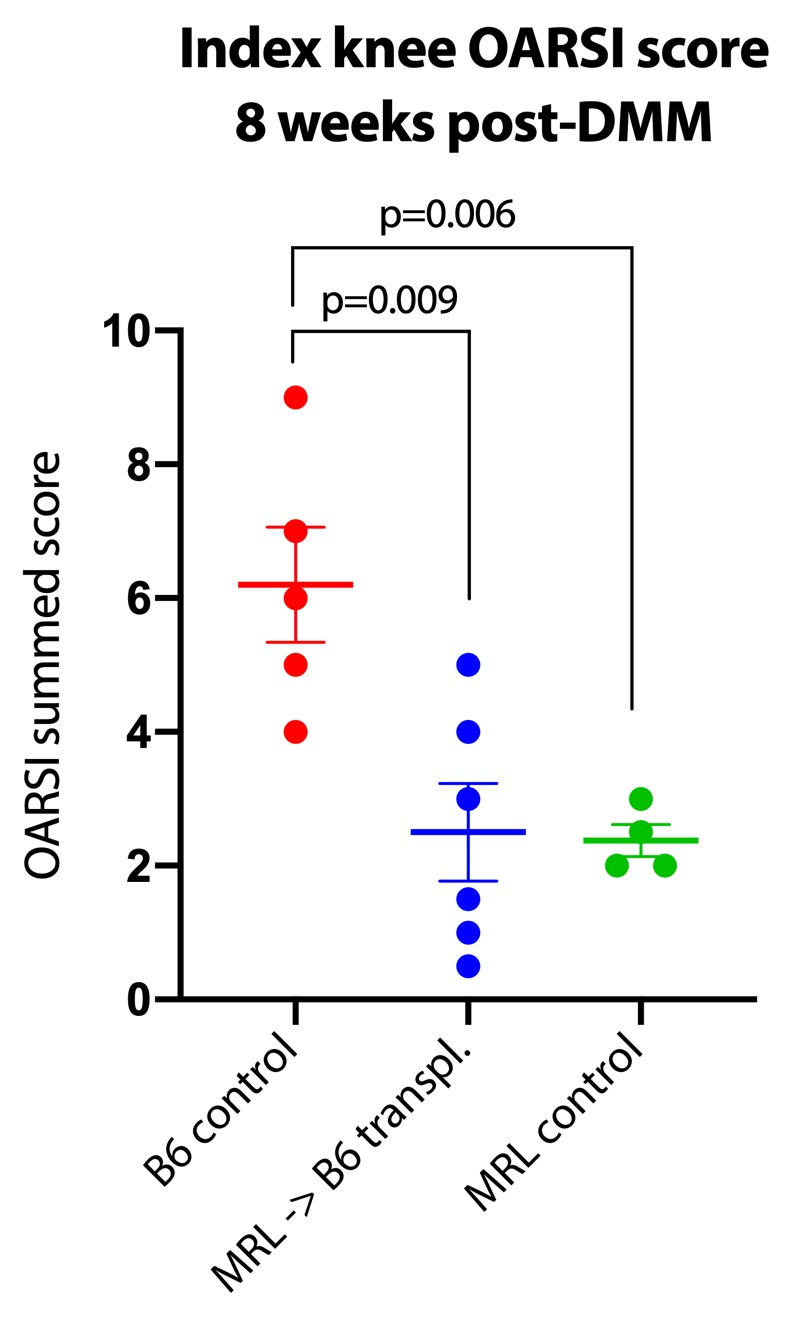Session Information
Session Type: Abstract Session
Session Time: 12:00PM-12:50PM
Background/Purpose: MRL/MpJ mice are substantially protected from developing post-traumatic osteoarthritis (OA), a trait with strong correlation to the ability to heal ear wounds. We have previously shown that this ear wound healing trait is partially determined by the gut microbiome, and that gut microbial transplantation into non-healer mice can confer the ear wound healing phenotype. In this study, we sought to examine whether microbiome-mediated cartilage regeneration extended to protection against post-traumatic osteoarthritis.
Methods: Twelve-week-old C57BL6/J mice were inoculated by oral gavage with diluted cecal contents from adult male MRL/MpJ mice (n=6). Separate groups of age-matched male C57BL6/J (n=5) and male MRL/MpJ mice (n=4) were gavaged with vehicle control. Destabilization of the medial meniscus (DMM) surgery was then performed unilaterally to induce OA. Eight weeks after DMM, mice were sacrificed, knee joints fixed in paraformaldehyde, decalcified, embedded in paraffin, stained with Safranin-O and histologically graded using the OARSI histopathology initiative recommendations by a blinded investigator. Differences in mean summed OARSI score per joint per group were determined by a Student t-test, p≤0.05 was considered significant.
Results: Adult male MRL/MpJ were protected against post-traumatic OA when compared to adult male C57BL/6J mice (mean summed OARSI score 2.4±0.2 vs. 6.2±1, p=0.006, Figure 1). MRL-transplanted adult male C57BL/6J mice were also protected against PTOA development (mean summed OARSI score 2.5±0.7, p=0.009 vs. B6 vehicle, Figure 1) and were indistinguishable from MRL vehicle mice (p=0.90). Representative histologic sections are presented in Figure 2. Gut microbiome profiling and associations of specific gut microbial clades with OA susceptibility are forthcoming.
Conclusion: Gut microbiome transplantation from OA-protected MRL mice to OA-susceptible B6 mice is sufficient to confer protection against post-traumatic OA, consistent with previous data indicating microbiome transplantation-mediated transference of the MRL earhole healing phenotype. Future research should define the pathophysiological changes underlying this phenotype and may offer new insights into potential future therapies for articular cartilage regeneration.
 OARSI scoring of mouse knee following DMM surgery in microbiome transplanted and control animals.
OARSI scoring of mouse knee following DMM surgery in microbiome transplanted and control animals.
 Example histology images of mouse knee following DMM surgery in microbiome transplanted and control animals.
Example histology images of mouse knee following DMM surgery in microbiome transplanted and control animals.
To cite this abstract in AMA style:
Jeffries M, Martin J, Izda V, Garman C, Velasco C, Dunn C. Gut Microbiome Transplantation from MRL/MpJ Mice Prevents Post-Traumatic Osteoarthritis in C57BL6/J Mice [abstract]. Arthritis Rheumatol. 2020; 72 (suppl 10). https://acrabstracts.org/abstract/gut-microbiome-transplantation-from-mrl-mpj-mice-prevents-post-traumatic-osteoarthritis-in-c57bl6-j-mice/. Accessed .« Back to ACR Convergence 2020
ACR Meeting Abstracts - https://acrabstracts.org/abstract/gut-microbiome-transplantation-from-mrl-mpj-mice-prevents-post-traumatic-osteoarthritis-in-c57bl6-j-mice/
